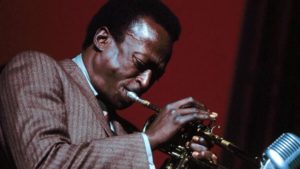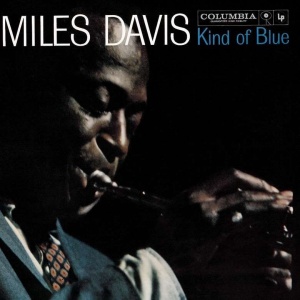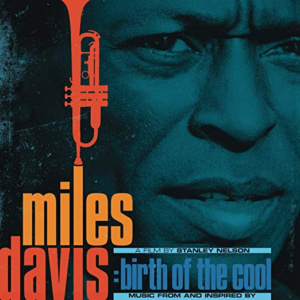Happy Birthday Miles Davis!
 Miles Davis was born on May 26, 1926 in Alton, Illinois. His father worked as a dentist and his mother was a music instructor. Davis was actually born Miles Dewey Davis III, with an older sister named Dorothy Mae and a younger brother named Vernon.
Miles Davis was born on May 26, 1926 in Alton, Illinois. His father worked as a dentist and his mother was a music instructor. Davis was actually born Miles Dewey Davis III, with an older sister named Dorothy Mae and a younger brother named Vernon.
Did you know?
- Miles was 13 years old when he started learning the trumpet, Davis’ first music teacher was a man named Elwood Buchanan.
- Davis grew up with a very affluent background. His first home was on a 200-acre estate in Arkansas, where he and his siblings’ pastimes included horseback riding and hunting.
- Davis was nominated for no fewer than 32 Grammy awards! He ended up winning eight of those awards across four decades of his career; the earliest win was in 1960 and the last one in 1993, two years after he died.
- Davis attended classes at the Institute of Musical Arts in New York City. Nowadays, the Institute is known as the legendary Juilliard School.
- The first time Davis ever recorded in a studio was on April 24, 1945. He was acting as a sideman for a band led by Herbie Fields.
- In 1948, Ellington’s orchestra was short a trumpeter, and Davis was offered the chance to fill that spot. However, Davis had to turn the opportunity down, since he was already committed to a band led by the equally legendary Canadian musician Gil Evans. What a time for a jazz musician to be alive!
- In 1955, Davis assembled his first important band with John Coltrane, Red Garland, Paul Chambers, and Philly Joe Jones, adding Cannonball Adderley in 1958.
- He was roommates with Charlie Parker.
- Early on in his career, Davis developed a musical group comprised of nine musicians. This was later known as the Miles Davis Nonet. Rare among jazz groups, the Miles Davis Nonet included the French horn and the tuba amongst its instruments.
- Among the many honors awarded to Davis, he gained a star on the Hollywood Walk of Fame in 1998 and was initiated into the Rock and Roll Hall of Fame in 2006.
- Besides his music, Davis also took up the occasional acting job or cameo appearance in film and television.

- Miles’ album Kind of Blue holds the honor of being the highest-selling jazz album of all time.
- During the late 1950s and early 1960s, Davis’ albums sold an average of around 100,000 copies each.
- In 1970, Davis performed at the Isle of Wight Festival, touring with rock bands rather than jazz artists. It proved to be the largest audience he would ever have; more than 600,000 people watched him perform on stage!
- According to frequent Davis collaborator Charles Mingus, Davis once spent a whole gig chewing out fellow musician Thelonious Monk.
- Davis was meticulous when preparing for a musical performance. One example was that Davis would avoid shaking hands before a performance, because he was worried about oil and residue from other people’s hands interfering with his ability to play. Another preparation he did was to wear a pair of shoes which were one size too small for his feet and tie the laces as tightly as possible.
- In September 1991, Davis suffered an intracerebral hemorrhage during a visit to the hospital. Tragically, he fell into a coma from which he never woke. He was taken off life support, leading to his death on September 28, 1991.
 Miles Davis made many contributions to jazz. He had a different style on the trumpet then most and played a straight vibratoless tone. Elwood Buchanan, his music teacher taught him a style of trumpet with more vibrato much different from the other famous jazz trumpet musicians like Louis Armstrong. This helped him find his own style. Miles experimented with styles and his trumpet playing was unique using tone, rather then speed. He changed the way jazz was played and inspired others to follow in his footsteps. Davis made Jazz more popular and won may awards and broke lots of records. Miles experimented with styles and his trumpet playing was unique using tone rather then speed. He won nine Grammy and plenty of other awards. Some might say that he was the best jazz trumpet player and will always be remembered throughout history.
Miles Davis made many contributions to jazz. He had a different style on the trumpet then most and played a straight vibratoless tone. Elwood Buchanan, his music teacher taught him a style of trumpet with more vibrato much different from the other famous jazz trumpet musicians like Louis Armstrong. This helped him find his own style. Miles experimented with styles and his trumpet playing was unique using tone, rather then speed. He changed the way jazz was played and inspired others to follow in his footsteps. Davis made Jazz more popular and won may awards and broke lots of records. Miles experimented with styles and his trumpet playing was unique using tone rather then speed. He won nine Grammy and plenty of other awards. Some might say that he was the best jazz trumpet player and will always be remembered throughout history.
Resources: Excerpts from Factinate “Blue Facts About Miles Davis,” Varunan and Ben
Become a Member
Join the growing family of people who believe that music is essential to our community. Your donation supports the work we do, the programs you count on, and the events you enjoy.
Download the App
Download KUVO's FREE app today! The KUVO Public Radio App allows you to take KUVO's music and news with you anywhere, anytime!
